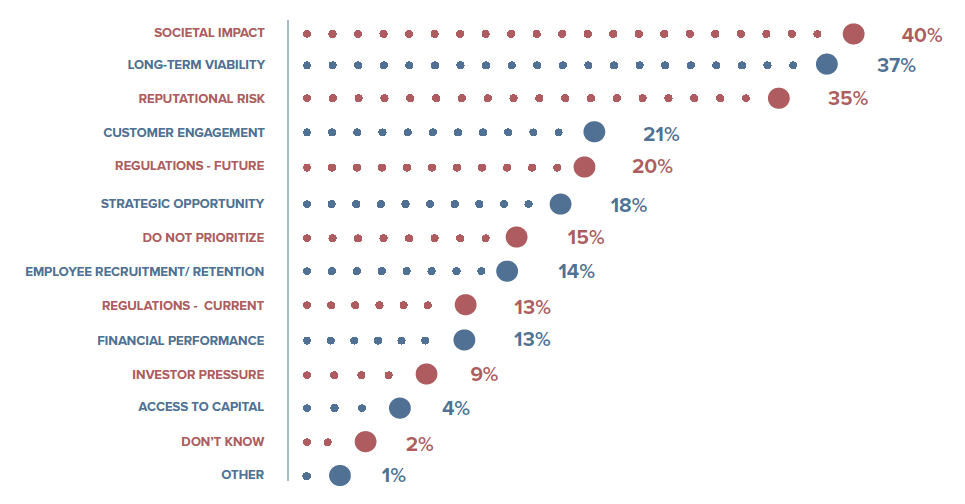Boards of directors are increasingly tackling environmental sustainability issues in meetings. Given the pressure applied by media and investors in recent months, directors around the world are facing challenging questions as they seek to pinpoint the board's role in environmental sustainability oversight: If boards engage in governance on environmental issues, or social issues, at what point do they infringe on management's domain? To what extent do these societal issues impact the bottom line? Is the fervor of investors and shareholders, the media, the public, and others on environmental issues just a "fad," or will the pressure mount? To what extent should boards expend time or energy on long-term environmental sustainability planning, versus taking more cursory measures or just waiting it out?
Diligent Institute, a new global think tank and Diligent's research arm, set out to understand just why directors were elevating environmental sustainability issues to the board level. In its first report, Winds of Change: Environmental Sustainability Rises to the Board Level (published Feb. 2019), the Institute asked 356 directors from 46 different countries to weigh in: What are your primary motivations for prioritizing environmental and sustainability issues at the board level?
Director Motivations for Board Environmental Sustainability Governance
Given that environmental sustainability issues impact businesses quite differently based on industry, company size, region of operation, and listing-status, it is especially striking that a top tier of motivations emerged so clearly. We highlight a few key findings below and pose further questions. Don't miss the full report, accessible on the new Diligent Institute website.
1. The three primary motivators emerged.
Societal impact (40%), long-term viability (37%), and reputational risk (35%) were the most frequently selected reasons that directors prioritized environmental sustainability issues at the board level. The next most popular motivation was a full 10+ percentage points away. So what themes can we draw from the global data?
As motivators, both "societal impact" and "long-term viability" support the narrative being told by today's largest institutional investors. BlackRock's Larry Fink has been pushing boards and companies at large to identify a "Sense of Purpose." Especially in today's rapidly changing environment, directors are concerned with future-proofing their companies and preparing for big disruptions down the line. Environmental degradation and the increasingly immediate impacts of climate change are key parts of the expected business landscape, and directors are treating them as such. The third motivator, "reputational risk," suggests that environmental sustainability issues have begun to appear on the board's risk radar. High profile corporate crises like Volkswagen and BP have demonstrated to companies the dangers of not taking environmental and sustainability issues seriously. And as one of the Diligent Institute's respondents pointed out, environmental sustainability issues are oftentimes being elevated from employee or customer level:
Good corporate citizenship is going up the register of what potential employees are looking for – they want to know that they work for a company doing "good things." It's partly generational and partly just the rise in social consciousness around looking for good employers. – Craig Winkler, a non-executive director at Xero Ltd., a global software company domiciled in New Zealand
2. Investor pressure was not cited as a primary motivator.
When looking at motivators, perhaps equally as interesting are the options that didn't make the top three: pressure from investors (9%). This is interesting because much of the discourse around governance of environmental sustainability issues has been focused on investor calls for change and the threat of investor intervention if improved oversight and transparency aren't achieved. Despite that, Diligent Institute's data suggests that directors don't see themselves as responding directly to investor demands. While the report notes that this is likely in part because management and investor relations departments are most commonly fielding investor requests, that's not the whole story.
Investor pressure, interest, activism, and research has sparked and pushed the conversation about environmental sustainability governance at companies around the world, but directors aren't merely acquiescing. They're responding to the same sets of circumstances that investors have identified and laid out - environmental risks and strategic environmental opportunities. It's significant that boards care about these issues far beyond discussing them because they were told to.
3. Boards expect more regulation around environmental sustainability issues ahead.
Barring certain industries, few regulations are in place to stipulate how boards must oversee or report on environmental sustainability issues. Yet, it certainly seems to be something investors are pressing for In a recent webinar, Brandon Rees, Deputy Director, Corporations and Capital Markets, AFL-CIO said about ESG reporting:"Companies are starting to provide this, but because we don't have uniform presentation of the information, it's very difficult for investors to digest it when you're relying on a CSR report as opposed to a uniform SEC disclosure. That's why we've petitioned the SEC to provide that enhanced disclosure that's both uniform and consistent across all market participants." For now, disclosure is largely voluntary, which means boards must exercise judgement around what and how they disclose, if they do at all. – Brandon Rees, Deputy Director, Corporations and Capital Markets, AFL-CIOCompany directors selected regulations as a reason to prioritize environmental sustainability issues to the board level 25% of the time. This runs counter to the narrative that directors are simply waiting for environmental regulation before taking steps to govern about it. Boards are being proactive. In fact, future regulations were selected by 20% of company directors and current regulations were only chosen by 13%. Strengthening environmental oversight and governance will put companies in a better place to respond to enhanced environmental regulation down the line.
You can read deeper analysis of how boards govern on environmental sustainability issues, including empirical analysis on how frequently boards expect to discuss the topic in the coming years and how they currently structure their oversight, by accessing the full report for free on Diligent Institute's website.
Diligent Institute is a think-tank founded in 2018 to offer a global perspective on the complex and disruptive board governance topics that directors and leadership teams are tackling today. The Institute serves as the global governance research arm of Diligent Corporation, the leading Enterprise Governance Management provider. Diligent Institute is solely funded by the Diligent Corporation.






